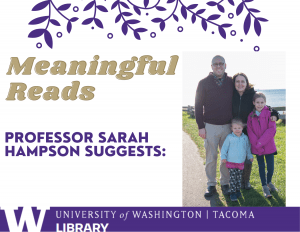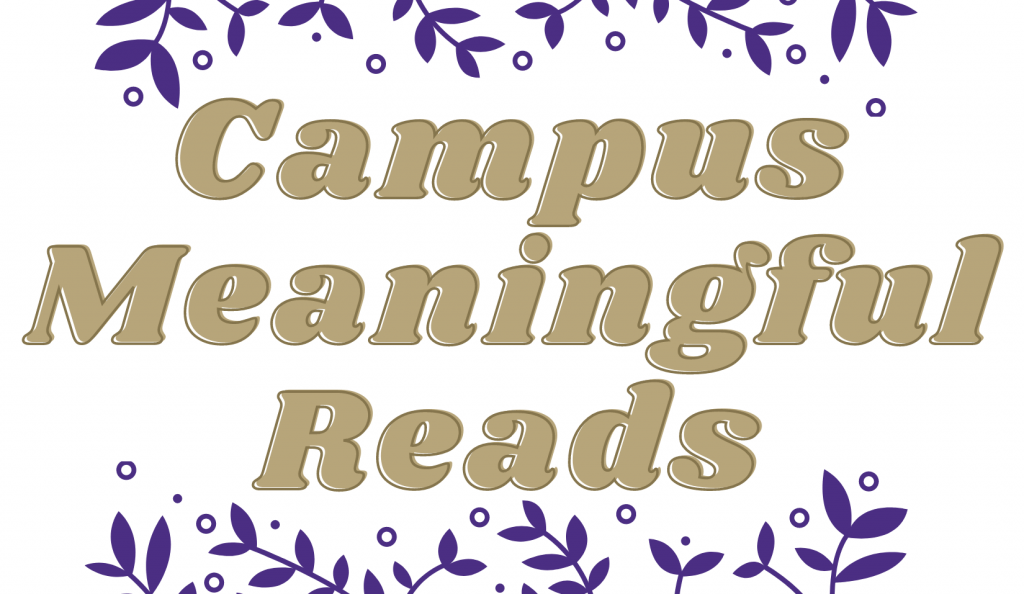Campus Meaningful Reads is a recommended book series celebrating faculty, staff, and students at the University of Washington Tacoma. Everyone is invited to share a book with thoughts on why the book was meaningful to their career, studies, or life.
This week, Dr. Sarah Hampson (SIAS/PPPA) and Dr. Benjamin Meiches (SIAS/PPPA) are sharing their meaningful reads.
Sarah Hampson’s Recommended Reading: Daring Greatly: How the Courage to Be Vulnerable Transforms the Way We Live, Love, Parent, and Lead by Brene Brown
 I am not usually a self-help guru book reader. At all. In fact, I usually love to recommend fiction, or at the very least you might expect me to recommend a political science or public policy book here! But your request asked for a book that has influenced either my personal or professional life, and this book (and Brown’s many other materials on the topic of shame and self-empowerment) really has touched both of these areas of my life profoundly. Brown is the consummate example of the public scholar – someone who makes her research accessible to everyone – and genuinely seems to want to engage the world like a classroom full of co-learners, which I really appreciate about her. Through her work, I have learned professionally to lead without fear, and to have self confidence in the work that I do. Personally, I have learned not to beat myself up about things I can’t control. In both, I have sought to develop resilience, rather than shame, as my guiding principle. I particularly love her “wholehearted parenting manifesto” (p 244) which includes the statement (from parent to child): “I will not teach or love or show you anything perfectly, but I will let you see me, and I will always hold sacred the gift of seeing you. Truly, deeply seeing you.”
I am not usually a self-help guru book reader. At all. In fact, I usually love to recommend fiction, or at the very least you might expect me to recommend a political science or public policy book here! But your request asked for a book that has influenced either my personal or professional life, and this book (and Brown’s many other materials on the topic of shame and self-empowerment) really has touched both of these areas of my life profoundly. Brown is the consummate example of the public scholar – someone who makes her research accessible to everyone – and genuinely seems to want to engage the world like a classroom full of co-learners, which I really appreciate about her. Through her work, I have learned professionally to lead without fear, and to have self confidence in the work that I do. Personally, I have learned not to beat myself up about things I can’t control. In both, I have sought to develop resilience, rather than shame, as my guiding principle. I particularly love her “wholehearted parenting manifesto” (p 244) which includes the statement (from parent to child): “I will not teach or love or show you anything perfectly, but I will let you see me, and I will always hold sacred the gift of seeing you. Truly, deeply seeing you.”
Sarah Hampson, Ph.D.
School of Interdisciplinary Arts and Sciences: Politics, Philosophy, and Public Affairs
Find Daring Greatly: How the Courage to Be Vulnerable Transforms the Way We Live, Love, Parent, and Lead in the Library
Benjamin Meiches’ Recommended Reading: On the Genealogy of Morals by Friedrich Nietzsche
 The book I selected for my meaningful read is On the Genealogy of Morals by Friedrich Nietzsche. I read this book for the first time when I was sixteen or seventeen. The themes from it continue to impact my thinking. Nietzsche investigates some of our most cherished assumptions about morality, good and evil, consciousness, and self-worth and demonstrates how they were born not only from historical contexts very different from our own, but blossomed from conservative, deeply resentful sentiments. A provocative exploration of how ideas of the good often conceal melancholia and unhappiness, Nietzsche challenges his readers to pose the unusual question: what value are my values? He shows us how little we know about to do that, how hard it is to undertake a self-inventory, and how frequently we thoughtlessly subscribe to outdated social conventions. His insights remain as potent today as when they were first written because they are untimely. My scholarship, which mainly explores how legal and political ideals conceal problematic values and give birth to conservative institutions, continues to be heavily influenced by lines of inquiry opened up by this book.
The book I selected for my meaningful read is On the Genealogy of Morals by Friedrich Nietzsche. I read this book for the first time when I was sixteen or seventeen. The themes from it continue to impact my thinking. Nietzsche investigates some of our most cherished assumptions about morality, good and evil, consciousness, and self-worth and demonstrates how they were born not only from historical contexts very different from our own, but blossomed from conservative, deeply resentful sentiments. A provocative exploration of how ideas of the good often conceal melancholia and unhappiness, Nietzsche challenges his readers to pose the unusual question: what value are my values? He shows us how little we know about to do that, how hard it is to undertake a self-inventory, and how frequently we thoughtlessly subscribe to outdated social conventions. His insights remain as potent today as when they were first written because they are untimely. My scholarship, which mainly explores how legal and political ideals conceal problematic values and give birth to conservative institutions, continues to be heavily influenced by lines of inquiry opened up by this book.
Benjamin Meiches, Ph.D.
School of Interdisciplinary Arts and Sciences: Politics, Philosophy, and Public Affairs
Find On the Genealogy of Morals in the Library
Thank you for sharing, Sarah and Benjamin!
Interested in participating in Campus Meaningful Reads? Let us know by filling out this participation form!
